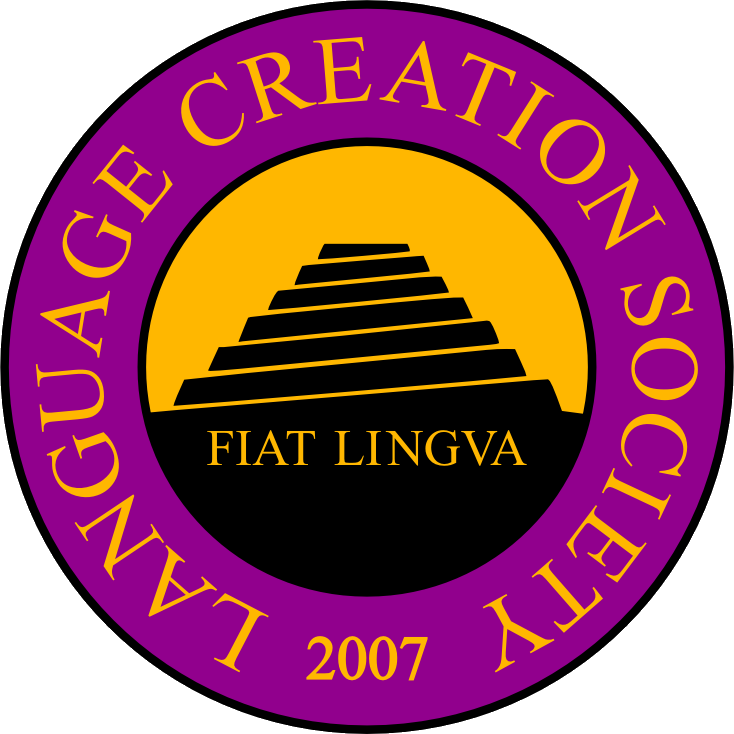Language Creation Tribune
Issue 8
February 2016
A word from our President
Welcome to the 8th edition of the Language Creation Tribune. Wow! I can’t believe I’ve been President for two years now! (And no one is plotting my demise as far as my spies have been able to ascertain, so I must be doing something right! Sorry, did I say that out loud?) Anyway, I am glad to be of service to the conlanging community, and I hope to carry on with it!
As you know, 2016 is what we could call an “LCC-less year.” Since the LCC4, the Language Creation Conference has been a biennial event, a schedule that fits our organisation well. However, as I’ve heard people saying they would like more frequent LCCs, even calling for “regional” or “informal” LCCs in off years, I thought I might clarify what my thoughts are on this.
First, people may remember that I’ve been saying that the conlanging community cannot support LCCs happening more frequently than once every two years. I want to explain exactly why I think this is the case. I’m not talking about a lack of interest—I know the interest is there. It’s not even a problem of getting enough people to attend a yearly LCC, although I do think that this could become an issue. Conlangers are typically not a very wealthy lot, and attending an LCC is not a cheap endeavour (especially if you have to fly to attend it). That’s why we try to keep attendance costs to a minimum, while still offering as much as possible (free lunches, for instance). This does mean that, given the costs we have for each LCC, we tend to run them at a loss. It is a manageable loss, given the current LCC biennial schedule, but I’m concerned that it would get worse if we moved to a yearly schedule. A yearly schedule would probably mean fewer participants at each LCC (many of us just don’t have the means to attend every year), which would mean a larger loss for us at each LCC (only part of the costs of an LCC is dependent on the number of attendees; venue location, for instance, is a fixed cost, regardless of attendance), which could easily start eating into our reserves unless we either increase attendance costs or remove features like free lunches. Both those measures would likely cause even fewer people to participate, meaning we would end up operating at an even larger loss… You can probably guess where I’m heading with this.
Yet even that isn’t the core reason I have for saying that the conlanging community cannot support more than one LCC every two years. The problem as it is right now isn’t actually with the attendance numbers or with the LCC budget. It is with getting people to organise the LCC itself, the local hosts. Look at it this way. Of the last three LCCs:
- LCC4 was organised by yours truly, not because I sent the LCS a proposal and won against other proposals, but because David Peterson asked me personally if I was interested in doing it after every person expressing the wish to organise an LCC ended up retracting their proposals;
- Although I was not involved in the organisation of the LCC5, as far as I know, the LCS was not submerged with proposals when it came to organising it;
- As for LCC6, Pete Bleackley’s bid ending up winning not only because it was the best proposal (although it always looked really good, and it would probably have won against other proposals), but because every competing host retracted their proposal before the deadline was even reached!
The issue here is quite simple: organising an LCC may not be extremely hard, but it is definitely time-consuming and (at least somewhat) stressful. The organisers really need to have enough time and energy to handle it, not to mention a very stable situation, or they simply won’t be able to handle the additional pressure. It’s not for everyone, as many have found out. Moreover, making a proposal isn’t just about throwing a few vague ideas about a venue. We need concrete plans for venue, lunch and technology, cost estimates associated with them, and more (see our checklist—warning: PDF).
So in the end, the main issue is not that the conlanging community cannot support attending more than one LCC every two years; instead, it’s that it cannot realistically support organising more than one LCC every two years.
That’s also why I don’t think proposals for “regional” or “informal” LCCs will help during our “LCC-less” years. LCCs are by nature already regional enough, and it’s definitely not the formal part of an LCC that is the bottleneck here. For now, we should keep our conferences on a biennial schedule—a schedule that works for our community and that allows the conferences to continue being great events.
That said, the need to meet like-minded people is strong, and I completely understand and share it. So what can be done during LCC-less years?
Once again, my answer is to turn it to you, the people who make up the conlanging community. As a reminder, the Language Creation Society is not here to “lead” the conlanging community. That would be arrogant and misguided. What we are here for is to support it, in all its endeavours. And that includes supporting conlangers who want to meet with other conlangers. But it’s up to you to take the lead on that. We can support you, but you’ll have to make the first step. I can imagine quite a few things people may want to organise:
- A simple conlang meet-up at some local bar in your area. We could help by advertising such events. Just tell us when and where you are planning something, and we will be happy to advertise it on social media, like we do for job submissions;
- Piggybacking an existing event. Some conventions (for instance Sci-Fi and Fantasy conventions) are likely to attract people interested in conlanging and conlangers themselves. If something is being organised in your area, let us know! We may look into participating in the convention itself (for which we will most likely need your help), or we could help you organise some sideline activity;
- Organising some event yourself. It may sound daunting, but I am not talking about something of the size of the LCC. I am not even talking about something like a conference. There are plenty of other things you can do to attract other conlangers, or at least people interested in conlanging. An exposition (schools and universities may help providing the necessary venue), a screening of the film Senn or of the upcoming Conlanging, the Film documentary, for instance, are ways to attract people. We can, once again, help, both with advertisement, advice, organising support, and even possibly financial support.
And these are just a few ideas on top of my head (you can also consider promoting conlanging in your area—a very good way to meet conlangers that you may have not known were even in your neighbourhood). Really, the LCC is just one out of many events that could be organised around conlanging. If you choose to take a step and organise an event or outreach, we are happy to support you. Also, don’t hesitate to discuss possible events to organise on the Members List. Who knows, there may be other people among our members who would like to help you!
So, go ahead and start organising! Let us know, and we’ll do our best to support you!
Fiat Lingua!
Christophe Grandsire-Koevoets,
President of the Language Creation Society.
Conlang Curiosities
by John Quijada
Using my koindarauk to order øŋgör
While I tend to seek out the odd and unusual when looking for material for this column, I also like coming across conlangs that simply demonstrate the author’s intense ardor for the craft of conlanging, along with an impressive level of detail, originality, and a scholarly exposition of the material.
A great example of this kind of conlanging work comes from linguistics student Zachary D. Hart. Zach is the creator of several conlangs associated with his conworld creation The Republic of Ánhrush on the planet Askath. The primary language on this world is Gomain, and Zach has spent over a decade lovingly composing an official Gomain Reference Grammar.
The attention to detail and overall academic rigor of the Gomain Reference Grammar is truly admirable. It is a model for other conlangers in putting together their own grammars. And the language itself is a testament to what can be accomplished in natlang-style conlanging, displaying not only an attention to detail but also the sorts of subtle, only-in-real-life grammatical quirks and lexical oddities I talked about in my presentation at LCC5 that add real verisimilitude to a natlang-style conlang.
Con-cultural background and con-history are all discussed in the introductory sections of the grammar, followed by sections devoted to phonology, morphology, syntax, lexical domains, dialects, an appendix on irregular verb paradigms, and a dictionary.
The following example illustrates the Gomain script as well as the system of nominal case-prefixes:
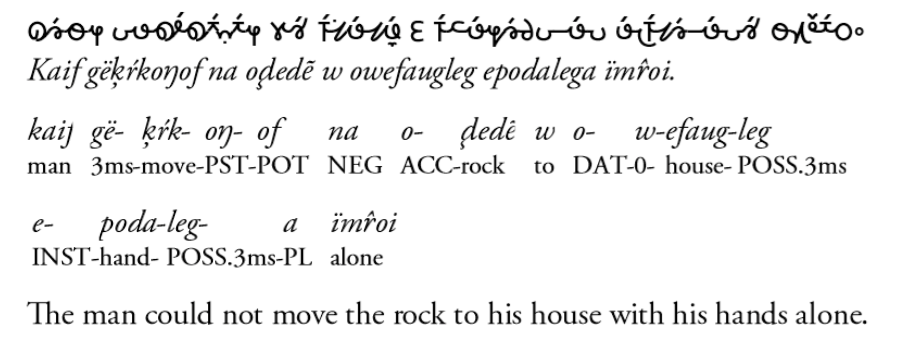
The language is mostly agglutinative, sometimes in the extreme, as for example:
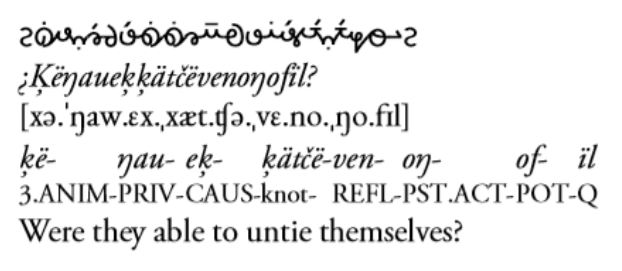
Unusually detailed rules for expressing mathematical operations are presented and illustrated, e.g.,
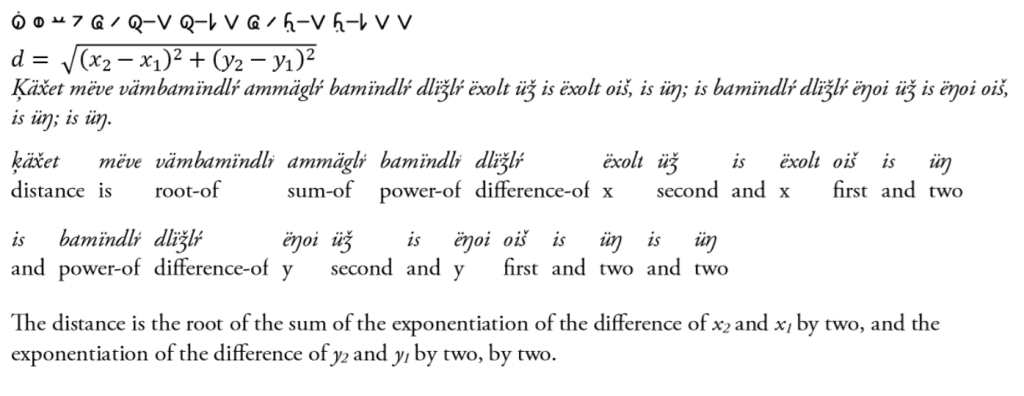
Interesting oddities include an “intrative” case (a locative case signifying “between two [of something]”); separate neutral, honorific, and pejorative second-person pronouns; four different infinitives for verbs (simple and perfect, each with an active and passive form); informal versus formal imperative forms; and nine distinct conjugational classes/paradigms for verbs, as well as numerous “classless” or irregular verbs. There is also a very rich system of correlative pronouns reminiscent of Esperanto:
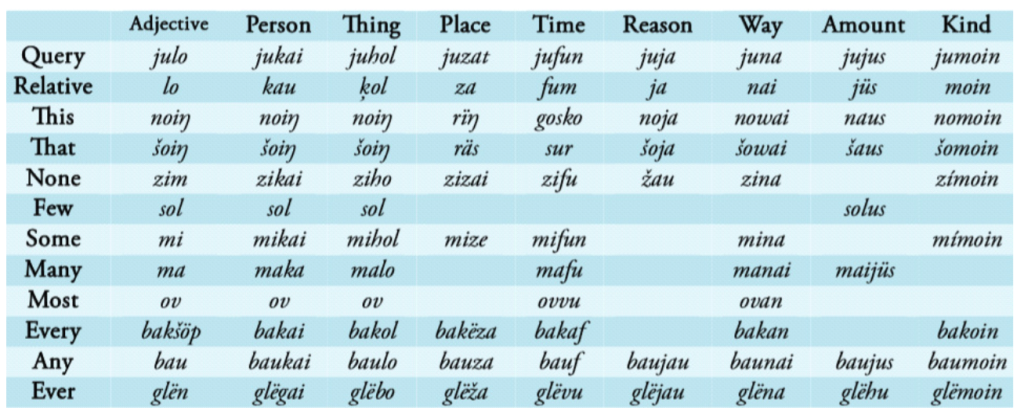
There is a whole section providing nicely detailed rules for derivational morphology, with separate sub-sections for nominalization of verbs, adjectivization, and verbalization of nouns. A sub-section on compounding shows a myriad of innovative ways that Gomain can combine words with each other to form new concepts. Gomain’s complex phonotactic constraints often lead to some interesting internal sandhi/juncture effects and elision in these compounds, e.g.,
- presäg ‘agreement’ + oproig ‘holy’ → preskoprë ‘covenant’
- aukau ‘physical power’ + aišu ‘lightning’ → aukaišu electricity
- ainu ‘air’ + praiķwei ‘say’ → aimpraikki ‘radio’
Some compounds utilize only part of their formative words (e.g., a single syllable), leading to some interesting results morpho-phonologically speaking e.g.,
- koïund ‘machine’ + darúde ‘logic’ + aukaišyn ‘electronic’ → koindarauk ‘computer’
There is a rich assortment of verbal moods in Gomain. In addition to the usual indicative, subjunctive, conditional and imperative, we have obligative (“I have to/must…”), hypothetical (“I could…”), potential (“I can/am able to…”), deductive (“presumably, I…”), dubitative (“I might be…”), and a cohortative mood which signifies encouragement of the subject to perform an action and whose usage is worth illustrating via examples:
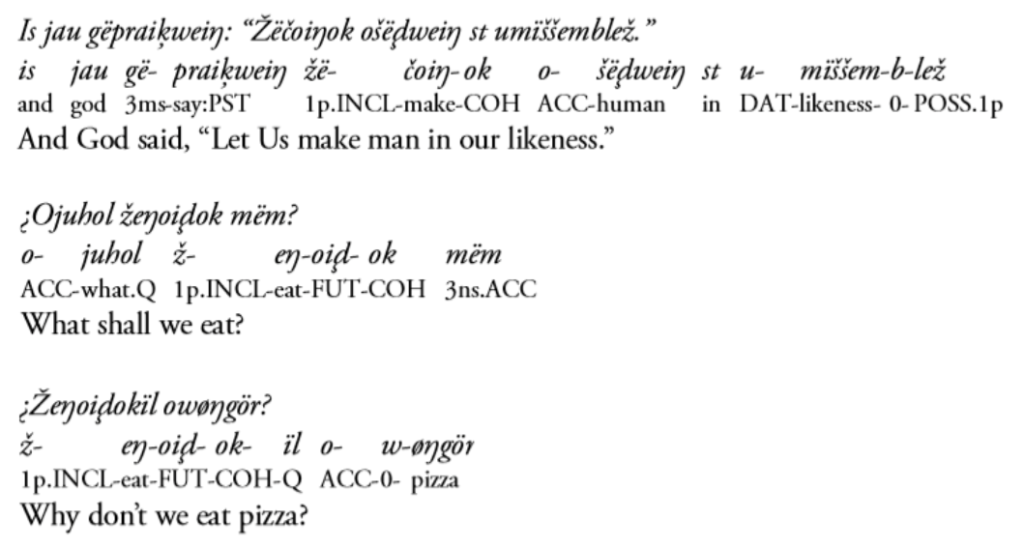
The above examples only hint at the richness of the Gomain language and its associated con-culture. Check it out! I mean, after all, how can you not want know more about a language whose word for “pizza” is øŋgör?
Conlanging News
Articles and online media relevant to conlanging
- ScienceLine wrote an article about conlangs, titled “Speaking in invented tongues.”
- The New York Times published an article titled “Create Your Own Language, For Credit,” which discusses colleges that offer courses on conlanging.
- FarpointCon took place Feb. 12-14 in Maryland; this year’s convention celebrated the 50th anniversary of Star Trek; Marc Okrand spoke about Klingon at the convention.
- Karen Myers offers advice for creating a language for a fantasy novel.
Fiat Lingua‘s latest articles
- December 2015: “Remembering Defiance” by David J. Peterson
- Abstract: The show Defiance aired on the Syfy network for three seasons from 2013 to 2015. It featured four full conlangs, each with its own writing system. This paper details some of what went into making that a reality.
- January 2016: “The Romanization of Middle Pahran” by George Corley
- Abstract: In this essay George Corley expands on his “Design Parameters for Romanization” (Corley 2011), defining five parameters for designing and discussing conlang romanizations: elegance, accessibility, aesthetics, internal history, and technical factors. He applies this framework in a detailed discussion of his own process designing the romanization for his current conlang, Middle Pahran. He pays special attention to overspecifying the phonology for accessibility, and to the compromises he made due to the technical limitations of the software he uses.
- February 2016: “The Birth of Xiis – A guide to font creation” by George Marques
- Abstract: This paper shows general instructions to create a computer font for Xiis (a conscript made by George Marques). It uses the free (libre) font-making application FontForge to overview the basic knowledge of OpenType features needed to make fonts for more complex writing systems and how they were applied to Xiis.
- Call for submission: Fiat Lingua publishes everything conlang-related, including reviews of conlang-relevant books, conlang grammars, essays on style, conlang criticism, scholarly work on a conlang-related topic, and conlang artwork and prose or poetic composition. If you have something you’d like to publish or have an idea you think might work as an article, email fiatlingua@nullconlang.org. All submissions must be in PDF format.
Conlangery podcasts
- December 2015
- Conlangery #115: Tsolyáni with Victor Raymond
- January 2016
LCS Member Milestones
Maria Rui Corley (王柯睿 Wáng Kēruì), daughter of George Corley and Li Wang Corley, was born on December 17, 2015 at 11:25:04 pm. Congratulations to the Corleys!
Post-production work continues on the Conlanging documentary by Britton Watkins, his husband, Josh Feldman and producers David J. Peterson, Christine Schreyer, David Salo, Marc Okrand and Paul R. Frommer. A crowdfunding campaign IS coming in March and Britton, David P., and Josh will be speaking on a workshop panel about conlangs and the film at Silicon Valley Comic Con (SVCC) also in March. They will be showing a 15 to 20 minute custom preview of the film at that time. If you can make it, please come. The custom preview will only be shown as a one off special sneak peek at the workshop event. Thank you, All, for your continued interest and support.
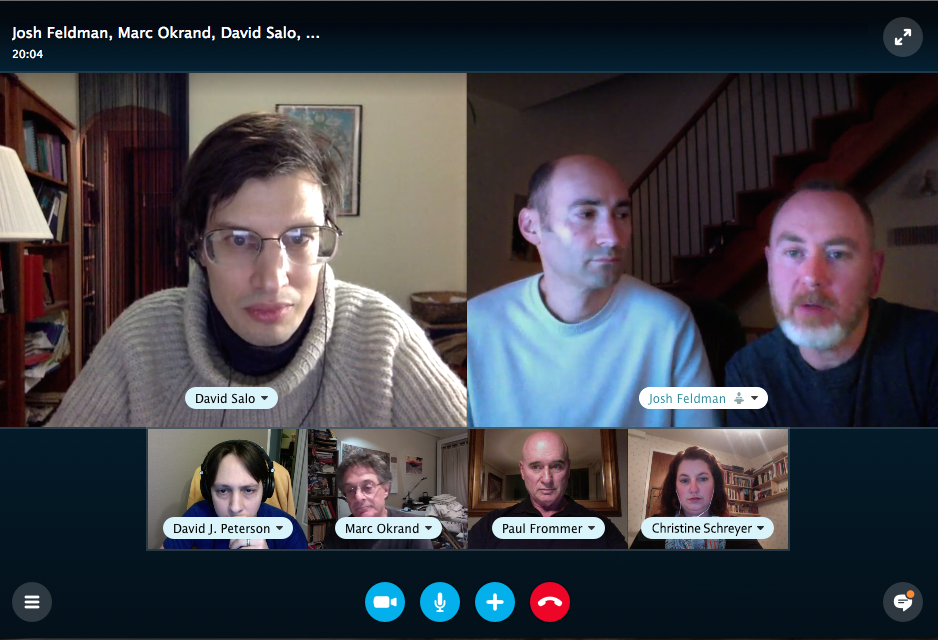
John Quijada has released a second music video from his Kaduatán progressive-rock music project. The new song is called Unk’àtân (the Ithkuil word for “renegades”); as with his first song, David J. Peterson sings the lead vocals in Ithkuil. The lyrics to the song with translation can be viewed on the “Texts” page of the Ithkuil website.
Lorinda Taylor completed the final volume of the SF/F series The Labors of Ki’shto’ba Huge-Head. The series incorporates her conlang Shshi, which is spoken by extraterrestrial termite people; the final book is titled The Buried Ship at the End of the World. Earlier volumes in the series are included in LCS’s library and have received positive feedback from our members.
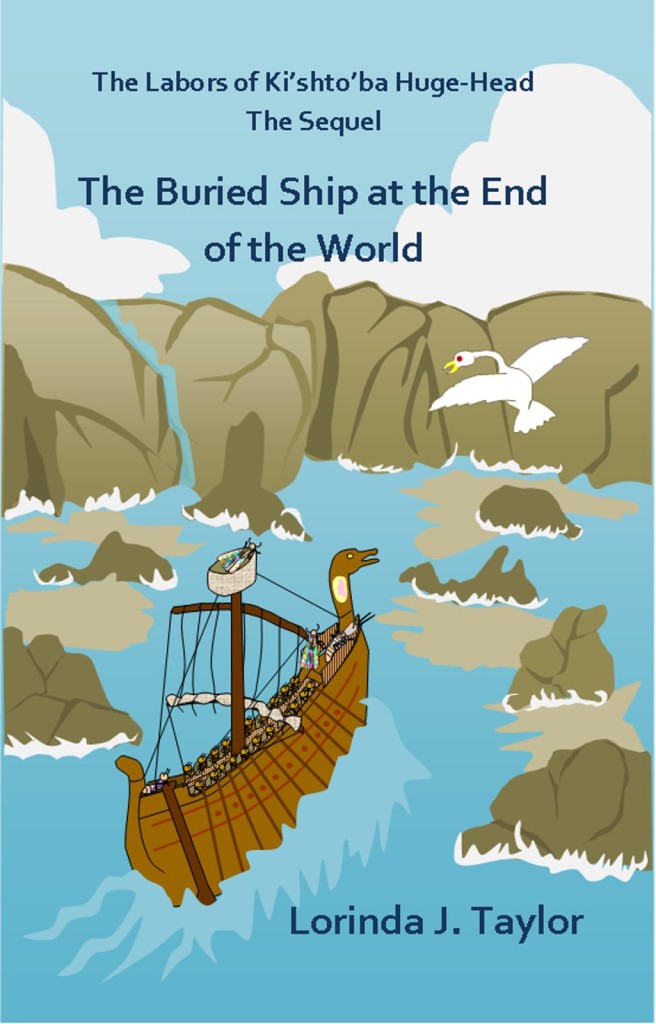
LCS Membership benefits
You can find more information about becoming a member, as well as more information on the benefits, here.
- Two permanent yournamehere.conlang.org domain names and free full web and email hosting; for more information or to fill out the form to claim a domain name, please visit this page.
- Checkout privileges for the LCS Lending Library.
- Access to a Hightail account (you can find more information about Hightail, an online file server, at its website); please email Sylvia to create your account.
- Full voting rights in the LCS.
- Discounts on all LCS events.
Please direct any questions you have regarding LCS membership to memberships@nullconlang.org. Also, all communication regarding your membership will come from that address as well, so please white-list memberships@nullconlang.org.
You shop. Amazon gives. If you shop Amazon, you can now support the LCS by using this Amazon link for your shopping. Amazon will give a percentage of its profits on all the purchases you make through that link to the LCS.
